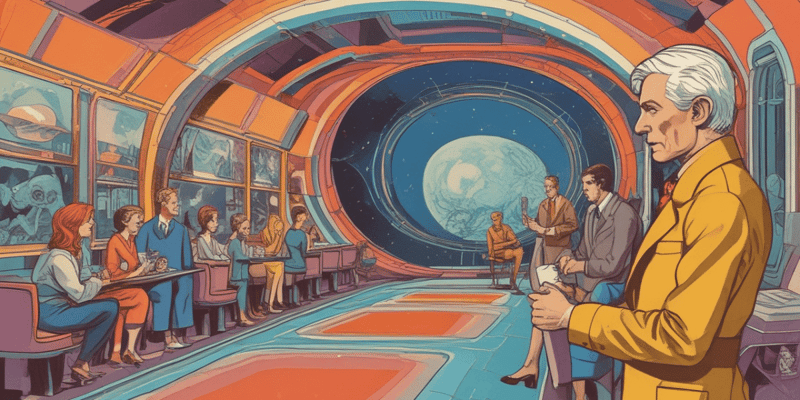Podcast
Questions and Answers
According to Erikson's theory of development, how many stages are there?
According to Erikson's theory of development, how many stages are there?
What is a key characteristic of each stage in Erikson's theory?
What is a key characteristic of each stage in Erikson's theory?
How does a person's difficulty in resolving a crisis in one stage affect their next stage?
How does a person's difficulty in resolving a crisis in one stage affect their next stage?
What is the developmental challenge during infancy according to Erikson's theory?
What is the developmental challenge during infancy according to Erikson's theory?
Signup and view all the answers
What happens if an infant is not well-loved during infancy according to Erikson's theory?
What happens if an infant is not well-loved during infancy according to Erikson's theory?
Signup and view all the answers
What is the outcome of developing a sense of basic trust during infancy according to Erikson's theory?
What is the outcome of developing a sense of basic trust during infancy according to Erikson's theory?
Signup and view all the answers
During the second stage of Erikson's theory, what is the developmental challenge for toddlers?
During the second stage of Erikson's theory, what is the developmental challenge for toddlers?
Signup and view all the answers
What is the outcome of allowing a toddler some scope for making choices during the second stage of Erikson's theory?
What is the outcome of allowing a toddler some scope for making choices during the second stage of Erikson's theory?
Signup and view all the answers
What happens if a toddler experiences excessive restraint or punishment during the second stage of Erikson's theory?
What happens if a toddler experiences excessive restraint or punishment during the second stage of Erikson's theory?
Signup and view all the answers
During the third stage of Erikson's theory, what is the developmental challenge for early childhood?
During the third stage of Erikson's theory, what is the developmental challenge for early childhood?
Signup and view all the answers
What is the outcome of developing a sense of initiative during the third stage of Erikson's theory?
What is the outcome of developing a sense of initiative during the third stage of Erikson's theory?
Signup and view all the answers
What happens if a child is discouraged and treated harshly during the third stage of Erikson's theory?
What happens if a child is discouraged and treated harshly during the third stage of Erikson's theory?
Signup and view all the answers
During which stage of Erikson's theory does the developmental challenge of industry versus inferiority occur?
During which stage of Erikson's theory does the developmental challenge of industry versus inferiority occur?
Signup and view all the answers
What is the outcome of a child who is encouraged and taught well during the industry versus inferiority stage?
What is the outcome of a child who is encouraged and taught well during the industry versus inferiority stage?
Signup and view all the answers
What is the likely outcome for a child who is unsuccessful at learning what is demanded during the industry versus inferiority stage?
What is the likely outcome for a child who is unsuccessful at learning what is demanded during the industry versus inferiority stage?
Signup and view all the answers
During adolescence, what is the challenge according to Erikson's theory?
During adolescence, what is the challenge according to Erikson's theory?
Signup and view all the answers
Which of the following is a possible outcome if an adolescent is unable to achieve a sense of identity?
Which of the following is a possible outcome if an adolescent is unable to achieve a sense of identity?
Signup and view all the answers
What is the developmental challenge during adolescence according to Erikson's theory?
What is the developmental challenge during adolescence according to Erikson's theory?
Signup and view all the answers
Which stage of Erikson's theory takes place in early adulthood?
Which stage of Erikson's theory takes place in early adulthood?
Signup and view all the answers
What is the challenge for young adults in the sixth stage of Erikson's theory?
What is the challenge for young adults in the sixth stage of Erikson's theory?
Signup and view all the answers
What happens to those who are unable or unwilling to make themselves vulnerable in the sixth stage of Erikson's theory?
What happens to those who are unable or unwilling to make themselves vulnerable in the sixth stage of Erikson's theory?
Signup and view all the answers
Which of the following best describes the challenge faced in middle adulthood according to Erikson's theory?
Which of the following best describes the challenge faced in middle adulthood according to Erikson's theory?
Signup and view all the answers
What is the likely outcome for individuals who focus on their own needs at midlife according to Erikson's theory?
What is the likely outcome for individuals who focus on their own needs at midlife according to Erikson's theory?
Signup and view all the answers
What is the main focus of a generative person in middle adulthood according to Erikson's theory?
What is the main focus of a generative person in middle adulthood according to Erikson's theory?
Signup and view all the answers
During which stage of Erikson's theory does the challenge of ego integrity versus despair occur?
During which stage of Erikson's theory does the challenge of ego integrity versus despair occur?
Signup and view all the answers
What is the outcome for a person who accepts what life has provided, good and bad parts alike, and concludes that it was a life well spent?
What is the outcome for a person who accepts what life has provided, good and bad parts alike, and concludes that it was a life well spent?
Signup and view all the answers
What is the outcome for a person who is filled with regrets and resentments in late adulthood?
What is the outcome for a person who is filled with regrets and resentments in late adulthood?
Signup and view all the answers
Study Notes
Erikson's Theory of Development
- There are 8 stages in Erikson's theory of development.
Stage 1: Infancy
- Developmental challenge: Trust vs. Mistrust
- Key characteristic: Developing a sense of basic trust
- Outcome of developing a sense of basic trust: Feeling secure and having a positive outlook on life
- If an infant is not well-loved during infancy: May develop mistrust and have difficulty forming trusting relationships later in life
Stage 2: Toddlerhood
- Developmental challenge: Autonomy vs. Shame and Doubt
- Key characteristic: Allowing a toddler some scope for making choices
- Outcome of allowing a toddler some scope for making choices: Developing a sense of autonomy and independence
- If a toddler experiences excessive restraint or punishment: May feel ashamed and doubtful about their abilities
Stage 3: Early Childhood
- Developmental challenge: Initiative vs. Guilt
- Key characteristic: Developing a sense of initiative
- Outcome of developing a sense of initiative: Feeling confident and taking on responsibilities
- If a child is discouraged and treated harshly: May feel guilty about their actions and lack confidence
Stage 4: Middle Childhood
- Developmental challenge: Industry vs. Inferiority
- Key characteristic: Encouragement and teaching skills
- Outcome of a child who is encouraged and taught well: Feeling competent and confident
- If a child is unsuccessful at learning what is demanded: May feel inferior and lack confidence
Stage 5: Adolescence
- Developmental challenge: Identity vs. Role Confusion
- Key characteristic: Exploring identities and roles
- Outcome of achieving a sense of identity: Feeling confident and secure
- If an adolescent is unable to achieve a sense of identity: May experience role confusion and uncertainty
Stage 6: Early Adulthood
- Developmental challenge: Intimacy vs. Isolation
- Key characteristic: Forming intimate relationships
- Outcome of forming intimate relationships: Feeling connected and loved
- If unable or unwilling to make themselves vulnerable: May experience isolation and loneliness
Stage 7: Middle Adulthood
- Developmental challenge: Generativity vs. Stagnation
- Key characteristic: Focusing on others and contributing to society
- Outcome of a generative person in middle adulthood: Feeling fulfilled and satisfied
- If individuals focus on their own needs at midlife: May experience stagnation and boredom
Stage 8: Late Adulthood
- Developmental challenge: Ego Integrity vs. Despair
- Key characteristic: Reflecting on life and feeling content
- Outcome of accepting what life has provided: Feeling satisfied and content
- If a person is filled with regrets and resentments: May experience despair and disappointment
Studying That Suits You
Use AI to generate personalized quizzes and flashcards to suit your learning preferences.
Description
Test your knowledge of Erikson's stages of development and their associated challenges. See if you can identify the key components of each stage and understand the potential risks of unresolved crises.



